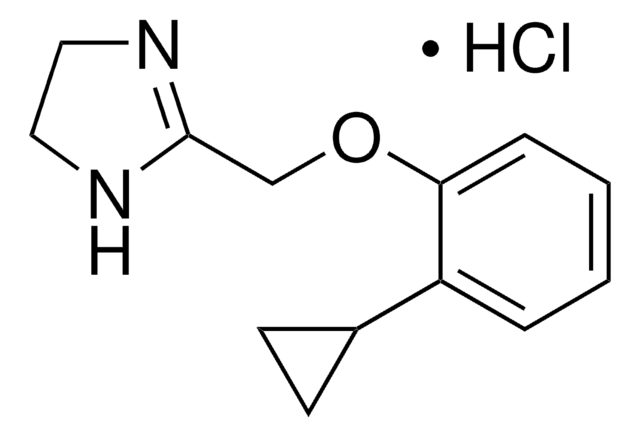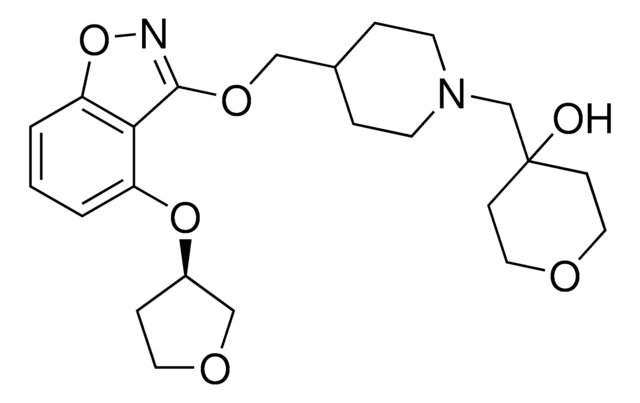P0111
Phenserine
≥98% (HPLC), solid
Synonym(s):
(−)-N-Phenylcarbamoyleseroline, 1,2,3,3a,8,8a-Hexahydro-1,3a,8-trimethyl-pyrrolo[2,3-b]indol-5-ol phenylcarbamate (ester)
About This Item
Recommended Products
Quality Level
Assay
≥98% (HPLC)
form
solid
color
off-white
solubility
H2O: <2 mg/mL
DMSO: >5 mg/mL
storage temp.
2-8°C
SMILES string
[H][C@]12N(C)CC[C@@]1(C)c3cc(OC(=O)Nc4ccccc4)ccc3N2C
InChI
1S/C20H23N3O2/c1-20-11-12-22(2)18(20)23(3)17-10-9-15(13-16(17)20)25-19(24)21-14-7-5-4-6-8-14/h4-10,13,18H,11-12H2,1-3H3,(H,21,24)/t18-,20+/m1/s1
InChI key
PBHFNBQPZCRWQP-QUCCMNQESA-N
Biochem/physiol Actions
Features and Benefits
Signal Word
Warning
Hazard Statements
Precautionary Statements
Hazard Classifications
Eye Irrit. 2 - Skin Irrit. 2 - STOT SE 3
Target Organs
Respiratory system
Storage Class Code
11 - Combustible Solids
WGK
WGK 3
Flash Point(F)
Not applicable
Flash Point(C)
Not applicable
Personal Protective Equipment
Certificates of Analysis (COA)
Search for Certificates of Analysis (COA) by entering the products Lot/Batch Number. Lot and Batch Numbers can be found on a product’s label following the words ‘Lot’ or ‘Batch’.
Already Own This Product?
Find documentation for the products that you have recently purchased in the Document Library.
Articles
Acetylcholine is synthesized from acetyl coenzyme A and choline by the enzyme choline acetyltransferase. In addition to its synthesis in the liver, choline employed in acetylcholine production is derived from dietary sources.
Acetylcholine is synthesized from acetyl coenzyme A and choline by the enzyme choline acetyltransferase. In addition to its synthesis in the liver, choline employed in acetylcholine production is derived from dietary sources.
Acetylcholine is synthesized from acetyl coenzyme A and choline by the enzyme choline acetyltransferase. In addition to its synthesis in the liver, choline employed in acetylcholine production is derived from dietary sources.
Acetylcholine is synthesized from acetyl coenzyme A and choline by the enzyme choline acetyltransferase. In addition to its synthesis in the liver, choline employed in acetylcholine production is derived from dietary sources.
Our team of scientists has experience in all areas of research including Life Science, Material Science, Chemical Synthesis, Chromatography, Analytical and many others.
Contact Technical Service







